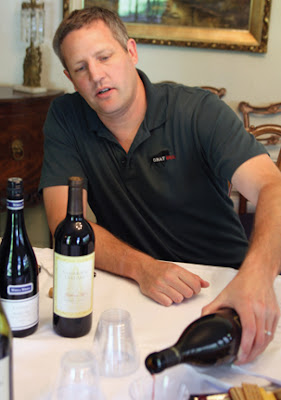With more than 6,000 U.S. wineries and around 20
distributors in Indiana it should not come as any surprise only a small number
of wines reach the Hoosier state.
That was what struck Derek Gray, Graybull Organic Wines,
back in college when sipping wine at Oliver Winery with some buddies. He
realized there could be some money made in the wine business. He started as a
home winemaker then moved toward a distributorship.
“A lot of wines were not available in Indiana,” Gray said.
“I thought there was a business opportunity. I’ve always wanted to own my own
business since I was a kid.”
So he started as a distributor hoping to sell 50 cases a
month to cover his warehouse cost. He was starting his business while working
at Eli Lilly in Indianapolis. He still does some work for the Indy drug
company. A distributor is the middle man in the three-tier system. He buys from
wineries and importers then resells to retail outlets.
 |
| Derek pouring at a private tasting. |
Gray started in 2006 and cut back at Lilly in 2009. His
business growth has been steady and impressive. “Even if you’re growing at 20
to 40 percent a year all of your money is going back into the business.” The
business has grown 30 percent already in 2012, he said.
Starting a new distributorship is like staring down the
neighborhood bully in Indiana. “Restaurants are horribly difficult to get into
especially if they’re established with one of the big distributors,” he said.
“The big boys will use everything they can to shut out everybody else. They
will print menus for free, which is legal. They will give them corkscrews. They
give them all sorts of stuff.
“They use the economic power they have and then put grocery
store wines on those wine lists and they get away with it.”
Gray wanted to operate his business and portfolio
differently. “We have an eco-friendly niche,” he explained. “We work hard on
customer service. We now have retailers coming to us because they’ve heard
about our customer service.”
Gray carries 400 labels in his portfolio. He stresses
customer service and getting the details right for his customers. “I would
argue our wines are solid across the board. If they don’t sell I weed them out.
They are family-owned wineries, many are highly rated, and most get 85 points
(from critics) or higher.”
Gray targets smaller retailers and wine stores. He sought out the best organic wines in the
U.S. and works with importers to get the best organic wines from abroad. Gray admits organic wines are not going to be
age worthy but for wines at the $10-$14 retail price point the wines will be
fruit forward, easy to drink and low to no sulfites.
The business has grown from that necessary 50 cases to
thousands each month. It recently led Gray to partner with another distributor
to represent his wines.
“I was an amateur wine maker. A bottle of wine is a living
thing; it’s an experience. It is a connection to the land and connection to
nature. To me, that’s the big part of the fun in the wine business. People in
the wine industry are eccentric and interesting.”
Derek’s Picks:
The wine distributor enjoys a beer after work but when it
comes to wine he recommends Washington State’s Columbia Valley to New Zealand
Sauvignon Blancs. “The red blends of Washington come from great family
wineries, small production and they to really great wines at a great price
point. The New Zealand Sauv Blancs used to be all grassy but are more complex
now.”
Howard W. Hewitt,
Crawfordsville, IN., writes Grapes Sense every other week for 18 Midwestern
newspapers. Contact him at: howardhewitt@gmail.com
No comments:
Post a Comment